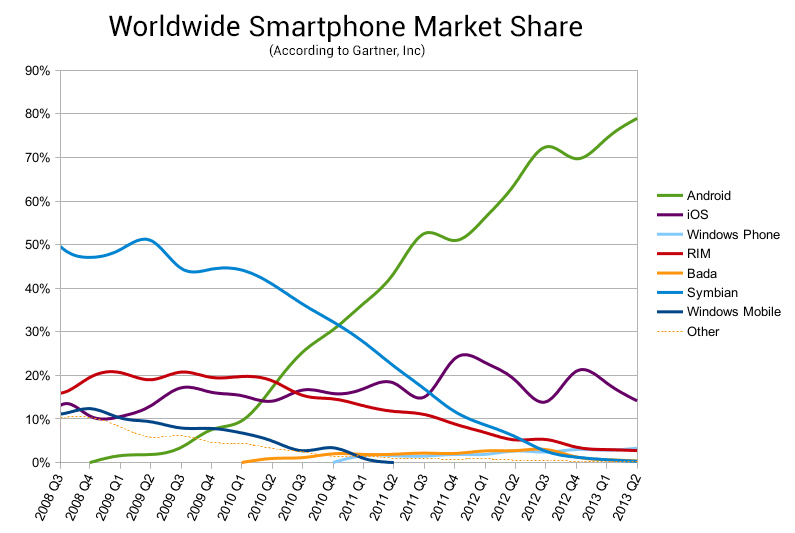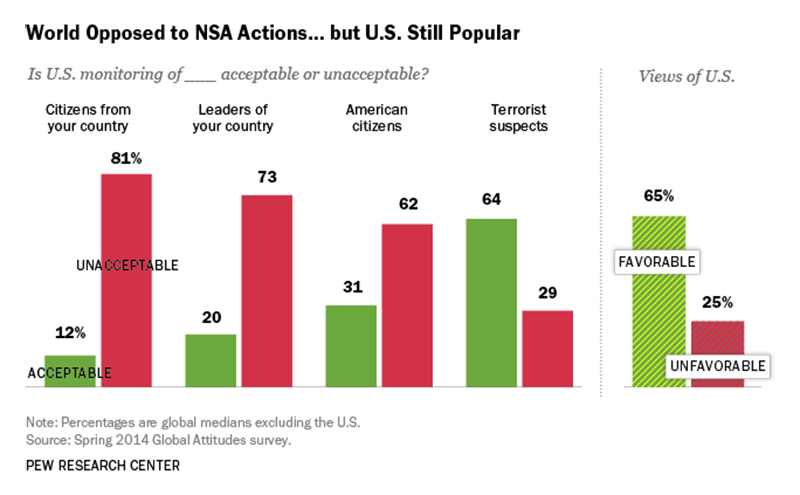A recent artificial intelligence acquisition by Apple may indicate that Apple could be headed in a direction that promotes consumer privacy.
While Google has never really been privacy-focused, but rather in recent years has become more and more dangerous for consumers who desire to maintain a level of privacy and security in our increasingly technological and Orwellian society, Apple on the other hand recently made a purchase of an AI company which may indicate a shift in the other direction.
Apple vs Google: a difference of philosophy
One major differentiating factor between tech giants Apple and Google has been of a philosophical nature. Historically, Google has pushed for open-source software, while Apple on the other hand has taken open-source and converted it into closed-source. For example, Apple took the free and open-source Unix-based operating system, and then, with only minor modifications to make it a bit more user-friendly, sold it for a premium, locked down the source, and blocked users from being able to make changes to the system.
Apple did something similar, even more dramatic, with iOS on their then-new iPods and iPhones, which were strictly locked down and pushed changes automatically – unless of course you had your device “jailbroken”, thankfully provided by the hacker community with each iOS iteration. Effectively, Apple’s stance was that users are stupid and have to be told what to do, how to use their own devices, and what it looks like. You might say that Apple subscribed to an ideology, “Apple knows best”, in the light that users do not know what is best for themselves. It’s interesting that Microsoft took a page from Apple’s playbook when they copied this ideology in the release of Windows 10, with forced updates, extreme privacy invasion, and lack of user control over their own systems.

It was Android’s open-source model which drove it to skyrocket to the top in such a short time.
Google on the other hand has in the past pushed for open-source and free software, releasing competing Android, which was fully open-source, completely free, and enabled the world to compete with Apple products. This was during a time when Google had the moniker “Don’t Be Evil”, which they infamously decided to remove several years ago as they have gone downhill. During that time, Google also worked on developing open-source Chrome OS, which could have competed against Microsoft’s Windows operating system. Unfortunately, the probable reason that Chrome OS has not gone very far is because Microsoft still holds an iron grip and monopoly on the computer software market. There are of course other factors, like software compatibility, but that is negligible compared to going up against a monopoly as big as Microsoft on their own turf, even when you are Google.
Apple’s AI acquisition could indicate a turning point for the company
Today, the wind seems to be shifting directions. While Google has becoming increasingly politically biased, activist, closed-minded, and tyrannical, a new artificial intelligence (AI) company acquisition by Apple, Silk Labs, may indicate that Apple is headed in the opposite direction. It seems a bit ironic that Google and Apple seem to be switching places, with Apple pushing for more open-source (or at least privacy-conscious) technology while Google’s recent AI acquisitions, Onward and Dialogflow, indicate that Google is working to promote surveillance and serve their own corporate interests for profit, at the cost of further decreased consumer privacy.
In 2016, Silk Labs crowdfunded an artificial intelligence smart home project on Kickstarter called Sense, a proposed smart home assistant which, unlike competing Google Home and Amazon Alexa, Sense focused on user privacy instead of mass data-collection. This is understandable since it was the will of the people through crowdfunding that drove the development of Sense, while corporate greed for further enrichment of Big Data funded by corporate giants who do not care about the privacy of their users funded the latter two privacy-invading smart home devices.

Sense brought consumers the first smart home device which was to have a major focus on privacy. With a budget of $100,000, it was successfully funded for nearly $165,000.
While Sense did not make it to market (and promised to refund its backers), it did not escape the notice of one of the other top mega-billion-dollar players in Silicon Valley – Apple. This is surprising, since Apple has been notorious for closed-source and high-priced software for over 2 decades, since the inception of Mac OS, when Apple purchased the Unix-based OS Darwin from NeXT in 1997 and converted it to a closed-source software. It is not surprising that it was around the same time that the board of directors at Apple fired their CEO (due to financial losses) and hired Steve Jobs in his place.
Could it be that the direction that Steve Jobs led Apple, which while wildly successful beyond any tech company’s wildest dreams, also embraced a closed-source model in order to maximize profits; that this direction has begun to shift back to a consumer-centric model, now that Steve Jobs is no longer around? It is very evident that with the tragic loss of Steve Jobs, Apple has struggled to maintain its place in the world. They had begun to lose their identity not long after Jobs passed, and the company has surely suffered since then, from their increasingly tyrannical policies which barely made sense anymore now that their identity was perhaps irreparably damaged. Let us not forget that while Steve Jobs was by no means perfect, he was one of the greatest marketing minds of history. Apple is what it is today because of Steve Jobs’ vision, and the world will never be the same. In some ways this is bad, but in other ways it has many benefits to society.
Apple accidentally made the world safer by enhancing technological accessibility
An interesting and ironic realization is that by bringing a billion cameras and GPS systems and screens to the world in everyone’s pocket by pioneering the smartphone, Apple has on one hand decreased individual privacy by unwitting enabling the possibility of mass surveillance, but on the other hand helped to increase freedoms by the tenet of accessibility. Pure accessibility has created an accountability that we could never have had if nearly every individual in every developed country did not have a high-powered portable computer with a camera in their pocket.

Smartphones with cameras have changed the world and influenced governments, and even the course of entire countries.
Tyranny has certainly been set back perhaps decades in some areas as a result, because with video and with access to information, and with an easier way to communicate, the people en-masse can crush tyranny in a way that was never before possible. For example, the tyranny of the middle east has largely been exposed, and the tyranny of Egypt was crippled by the ubiquitous access to smartphones, making the people uncontrollable by a dictatorial and oppressive government regime. By contrast, North Korea is still suffering and oppressed beyond imagination, and this is largely due to the fact that the oppressive North Korean regime puts extreme limitations on technology. If all North Koreans had smartphones today, tomorrow the world would be so outraged, that developed nations would be forced to declare war on the North Korea as a matter of basic human rights. If you control the information, you control the country.
Could it be that Apple is embracing their new power in the world for change, and could it be possible that Apple is recognizing the extremely strong desire for individual privacy in an increasingly privacy-conscious world? It would indeed be a powerful and very effective way to enter a new market, by submitting to the will of the people and consumer desires instead of bowing to the will of the corporations who seek to increasingly exploit every last facet of consumer life. Perhaps Apple is realizing that if consumers get too fed up, they may begin avoiding technology altogether, and this would spell doom for a company like Apple which prides itself on innovation, technological beauty, and meeting the needs of the consumer.
If Apple becomes more privacy-focused, it could make the world a better place
If Apple really does take a different path from the other Silicon Valley giants and aims to increase consumer privacy, they will almost certainly garner a new wave of fans who previously avoided Apple due to its closed model and overpriced systems. Surely there are plenty of people who would be willing to pay a premium for privacy, so this would fit very well with Apple’s business model of providing premium products at premium prices that people want. In today’s world, surely there is a massive desire for privacy, and a people who feel they no longer have the ability to even buy their own freedom and privacy, since self-interested tyrannical corporations control the world’s latest technology.

A study done by Pew Research showed that almost all Americans are opposed to surveillance and thus value their privacy (with only the exception of terrorist suspects).
If Apple stepped in and provided this, there would certainly be a market of people who would pay a premium for the ability to embrace modern technologies like artificial intelligence and voice-recognizing smart home devices, where currently they refuse to allow such products in their homes or workplaces for fear of egregious violation of privacy and basic human rights of freedom and liberty. As a result, without a source to release technology which is open, free, and embraces privacy, even the most technological-savvy individuals will become increasingly afraid of using much modern technology. Indeed, there are many people who are considering regressing to a less technological way of life that ensures a safer existence.
Moreover, many people are fearful of each new technology like AI, smart cars, smart homes, internet of things, new wireless devices, and more, because they are afraid that these devices will be used against them, both now and in the future. People are right to fear much of these increasingly privacy-invading modern technologies, because the companies are not exactly covert about their intentions to use the information they gather for whatever they desire, without considering the desires, rights, or concerns of their consumers. As a result, there is a huge market today that is ripe for picking by the next companies which decide to deviate from the Orwellian nature of most Silicon Valley technological giants.
Will Apple be the one to step in, or will this market be captured by a vast array of small startups? While the promotion of technological startup culture is definitely something to be desired, if a tech giant like Apple was to also embrace a new era of privacy-conscious consumers, then it could spell a changing tide of a safer and better world, where people no longer have to fear new technology, but can embrace it, so that we can move into the next age of technological advancement.





You guys are giving really cool reviews.